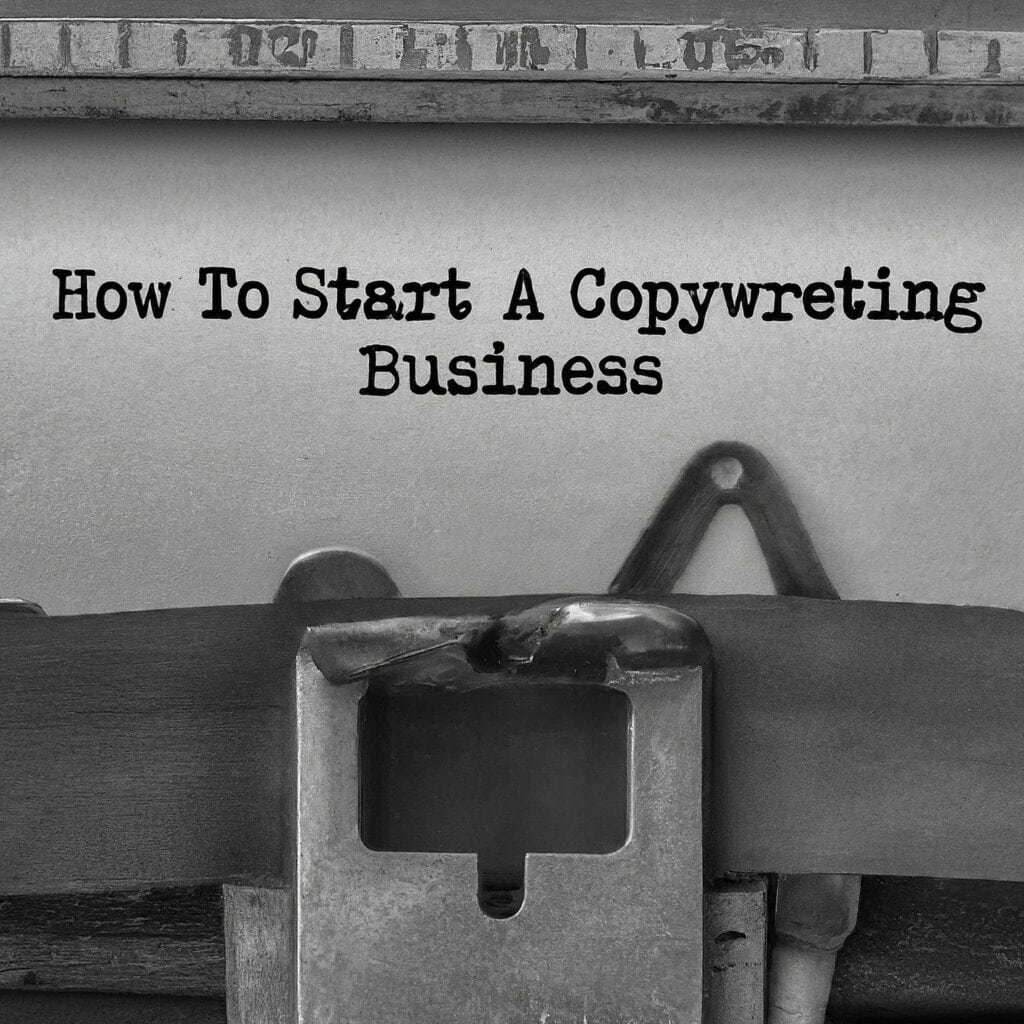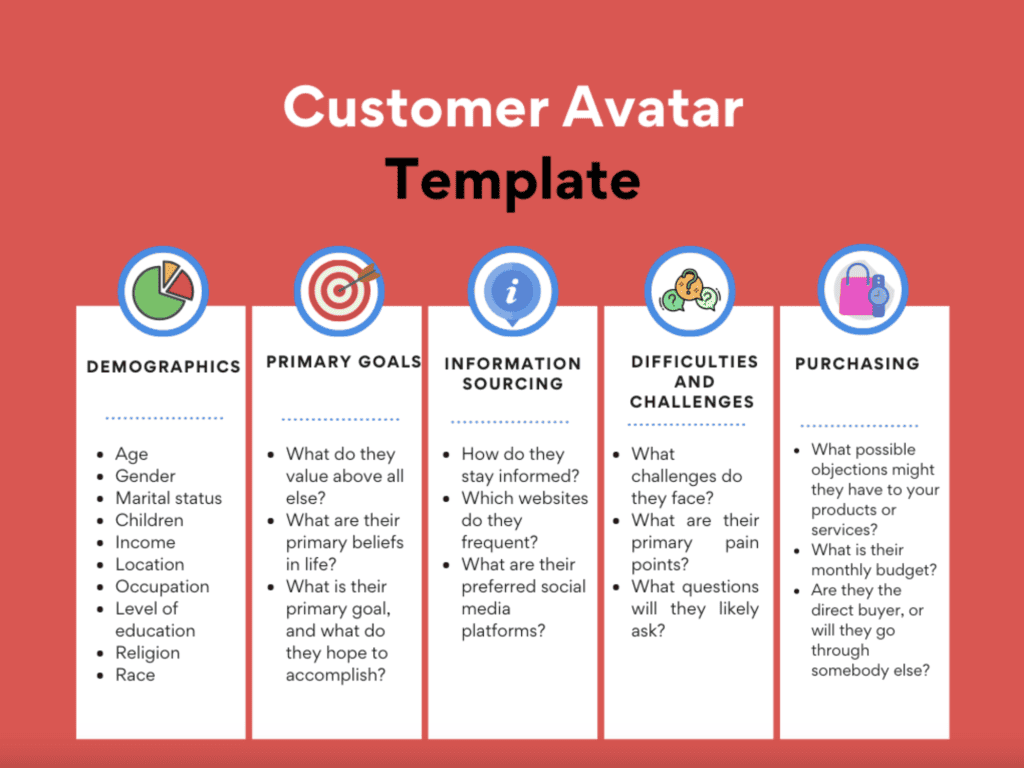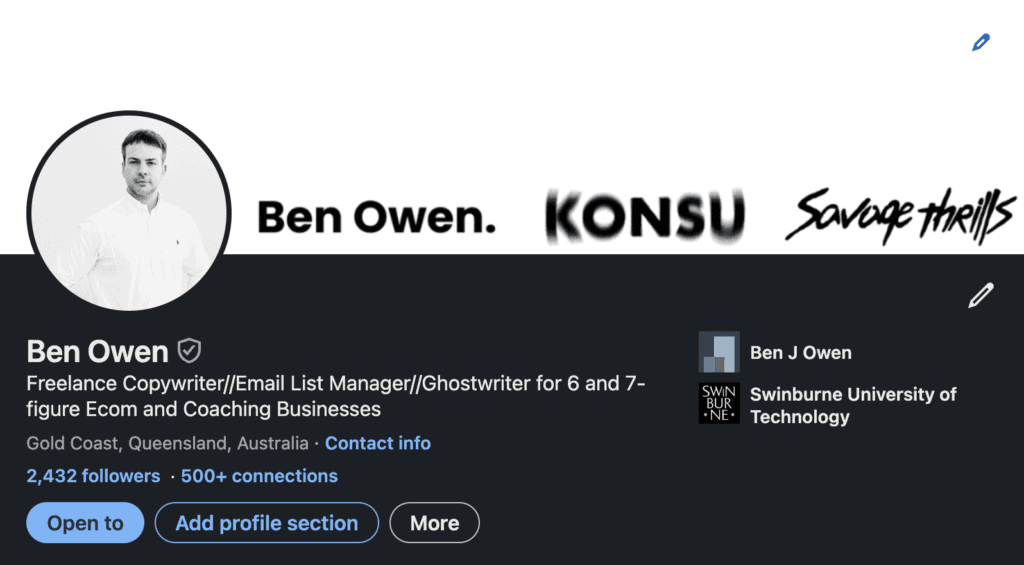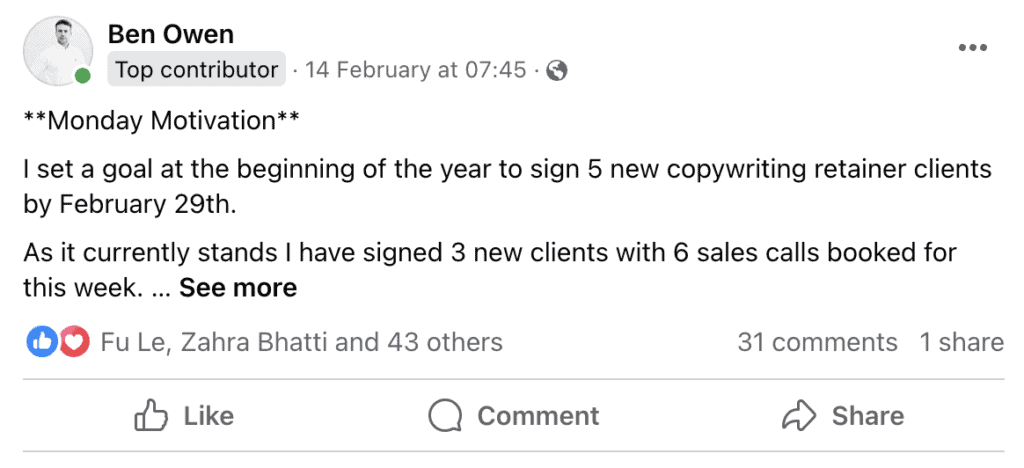Why Should You Start a Copywriting Business?
Table of Contents
- 1 Why Should You Start a Copywriting Business?
- 2 Who Does a Copywriter Work For?
- 3 Freelance vs. In-House vs. Agency Copywriters
- 4 Can a Copywriter Earn 6-Figures?
- 5 Starting a Copywriting Business
- 6 How To Start a Copywriting Business and Become a Copywriter
- 7 How many Copywriting Niches are There?
- 8 Should you take a Copywriting Course and Learn the Basic Skills?
- 9 Build and Create Your Copywriting Portfolio
- 10 Determine Your Niche
- 11 Determine Your Services Offered
- 12 Create your ideal client avatar
- 13 Create Your SOPs (standard operating procedures)
- 14 Promote Yourself and Create a Digital Presence
- 15 Start Networking
- 16 How to start a Copywriting Business FAQs
- 17 What is a copywriting business?
- 18 Are copywriting businesses profitable?
- 19 Can you make 10k a month copywriting?
- 20 Will AI replace copywriters?
- 21 Final Thoughts on How to Start a Copywriting Business
Let’s be clear a career as a copywriter offers immense freedom and flexibility.
No longer will you be chained to a soul-sucking 9-to-5 job, you’ve wanted to escape for god knows how long.
As a copywriter, you become the master of your own time and that’s what many of us crave…
Time and freedom to live life on our own terms, unlike the current position you most likely hold.
But it’s not just about escaping the clutches of corporate monotony; it’s about embracing the power of words.
Being able to craft compelling and persuasive content is an invaluable skill every successful copywriter must possess.
Think about it – every website, every advertisement, every email blast requires someone who can spin words into gold.
Furthermore, starting a copywriting business allows you to tap into your creative side while still making a handsome living.
Copywriters can earn six figures or even more if they’re willing to put in the work required.

Who Does a Copywriter Work For?
It’s crucial to understand one fundamental question: as a copywriter who exactly do we work for?
Well, that all depends on which route you want to take on your copywriting career path.
Think small, medium and large businesses almost all industries use copy in one form or another.
Your copywriting services can be broken down into three key areas where your copywriting skills will be required.
Below I go in-depth on each of these three areas to give you a clear rundown.

Freelance vs. In-House vs. Agency Copywriters
Working as an Agency Copywriter
PR, Digital Marketing Agencies and Advertising Agencies all require written content created by copywriters.
From blog posts to email marketing and everything else in between. Agencies handle a wide scope of work on behalf of their client base.
Agencies provide an environment where creativity thrives through collaboration and brainstorming sessions marketing and copywriting projects.
The diversity of clients keeps things interesting as agency copywriters jump from one industry to another.
In-House Copywriting Jobs
In-house copywriters, These brave souls sacrifice their autonomy for stability (and perhaps some dental benefits).
As an In-house copywriter, you have the privilege of focusing solely on one brand or business.
They get to immerse themselves in their company’s culture and become its voice through words alone.
However – brace yourselves again – they often find themselves caught in endless cycles of bureaucracy and mundane tasks that zap away their creative energy faster than you can say “jargon-filled meeting.”
Starting a Freelance Copywriting Business
For freelance copywriters starting their own business can be somewhat a double-edged sword.
On one hand, you have the freedom to choose your own types of clients and work on projects that truly ignite your creative fire and charge premium rates.
However – and this is a big, however – freelancing requires an iron will and self-discipline of steel.
You need to constantly hustle for clients, negotiate contracts like a seasoned lawyer, and wear multiple hats as a writer, marketer, and action your business accounting.
Perhaps try dipping your toes into each pool to see which waters suit you best. Don’t be afraid to take risks and explore different paths until you find your perfect fit.
Can a Copywriter Earn 6-Figures?
Yes, you absolutely can earn a six-figure income as a copywriter. Don’t let anyone tell you otherwise!
As a skilled copywriter, your ability to craft persuasive and engaging content is invaluable to businesses of all sizes.
From multinational corporations to local startups, every company needs effective marketing and advertising materials consistently.
Earning six figures as a copywriter won’t come overnight or without hard work. It requires dedication, continuous learning, and relentless honing of your craft.
You must stay up-to-date with industry trends, study successful campaigns from the past and present, and constantly refine your writing skills.
Copywriting is not just about passion; it’s about professionalism. So, invest time in improving your writing skills, study the masters of the craft, and learn how to create impactful copy that generates real results.
Remember, success in this business is directly proportional to the effort you put into not only yourself but your business.

Starting a Copywriting Business
How To Start a Copywriting Business and Become a Copywriter
Starting any business requires dedication, unwavering passion, and an insatiable hunger for success.
And your soon-to-be successful copywriting business is no different.
One of the first things you need to do when starting a copywriting business is to define your target market.
Are you going to be catering to small businesses or larger corporations?
Whichever path you choose, you have the power to shape their brand voice, amplify their message, and ultimately contribute to their success.
Once you’ve honed in on your target market, it’s time to roll up your sleeves and start hustling.
Building a client base from scratch may seem daunting, but remember that every great empire was once just an idea in someone’s mind.
You could start by reaching out to potential clients in your area and offering them your expert services.
Be confident in what you bring to the table and convey how these business owners will benefit from working with you.
Be sure to create an online presence that showcases your copywriting skills.
At the very least you need a copywriting portfolio where potential clients can see writing samples of your work and get a sense of who you are as a professional.
Remember: starting a copywriting business isn’t just about writing compelling copy.
It’s about being a strategic partner for your prospective clients, someone who understands their goals and helps them achieve their marketing and sales outcomes through words.
How many Copywriting Niches are There?
There are a whole host of niches and industries a copywriter can work
Below I will list a
1. E-commerce: If there’s one niche that reigns supreme in email marketing, it’s e-commerce. With online shopping booming like never before, companies are constantly in need of persuasive and engaging email campaigns to drive sales.
2. SaaS (Software as a Service): Software companies are multiplying rapidly, and they all require effective marketing strategies to attract and retain customers. This is where a professional copywriter can assist with copywriting services such as blog posts, social media posts, email marketing and, technical writing.
3. Financial Services: Money makes the world go round, and so does effective financial services email copywriting. Banks, investment firms, insurance agencies – they all rely heavily on persuasive emails to communicate with their customers effectively.
4. Health & Wellness: As people become increasingly health-conscious, whether it’s hitting the gym or buying dietary supplements. These companies need all the marketing help they can get, this is a highly competitive niche.
5. Education: Educational institutions, online course creators, and tutoring services are all in search of skilled copywriters who can craft persuasive marketing copy to engage prospective students.
6. Real Estate: The real estate industry is highly competitive, and marketing is crucial for realtors and property developers alike. Writing persuasive copy that showcases properties effectively, highlights investment opportunities, or nurtures leads through the buying process is key in this niche.
7. Fashion & Beauty: Fashion & Beauty brands need persuasive copywriters who can entice readers. This is a highly competitive niche and any leg-up a brand can over its competitors is a major win for them.
Should you take a Copywriting Course and Learn the Basic Skills?
Some might argue, “Why waste time and money on a course? Can’t you just learn by doing?”
While hands-on experience is indeed valuable, it’s like trying to build a house without a solid foundation.
A copywriting course provides you with the sturdy groundwork necessary for success in the copywriting industry.
Remember, you’re investing in yourself and your future as a copywriter.
Would you trust an architect who learned their craft from random YouTube videos?
I think not! Seek out reputable courses taught by seasoned professionals who have amassed years of real-world experience as successful and experienced copywriters.
During these courses, you’ll learn the craft of copywriting such as writing techniques specific to various platforms like websites, email campaigns, social media ads, and sales letters.
You’ll discover how to craft captivating headlines that grab attention like a ferocious lion sinking its teeth into prey – sorry vegans!
You’ll also delve into the art of storytelling to create emotional connections with your readers; after all, people don’t want just facts – they crave compelling narratives that stir their souls.
Moreover, these courses will expose you to persuasive techniques that will make your writing irresistible.
But let me be clear: taking a course alone won’t transform you overnight into a genius wordsmith.
It requires practice – hours upon hours spent honing your craft until your words flow effortlessly onto paper (or screen).
The coursework will provide assignments and exercises designed to challenge your creative muscles and push you beyond your comfort zone.
Keynote: Don’t underestimate the power of feedback and critique.
Writing Skills
As a copywriter, your words have the power to captivate, persuade, and drive action. Mediocre writing simply won’t cut it in this competitive industry. Potential clients want to see results and fast, what else are they paying you for?
Your words should flow seamlessly and effortlessly across the page, leaving no room for doubt or confusion.
Remember, you are crafting compelling messages that need to be crystal clear for your client’s target audience.
Your writing should transport readers on a journey where they connect emotionally with the brand or product you’re promoting. But wait!
There’s more than meets the eye when it comes to writing as a copywriter.
You must master brevity without sacrificing impact – a delicate dance of conciseness and substance.
Strip away any unnecessary fluff while delivering powerful messages that leave an indelible mark on readers’ minds.
Knowledge is power – delve deep into industry trends, competitor analysis, and consumer behaviour.
Arm yourself with data and insights that serve as the backbone of your persuasive writing.
This research-driven approach will elevate your credibility and enable you to craft messages tailored explicitly to your client’s
Becoming a proficient copywriter requires dedication to honing your writing skills.
target market.

Research Skills
Research skills are the holy grail of success.
Yet, many aspiring copywriters overlook the importance of this crucial skill.
Without proper research skills, your copy will fall flat on its face faster than a marathon runner with a cramp.
Let’s be brutally honest here. Copywriting is not just about stringing words together like a literary genius.
It’s about understanding your audience, their needs, desires, fears, and motivations. And how do you do that?
Through extensive research! You need to dig deep into the minds of your target market and uncover what makes them tick.
Nowadays, it’s easier than ever to conduct research with a multitude of tools at our disposal.
From social media platforms to online forums and surveys, there’s an abundance of information waiting to be discovered.
Where does your client’s target market hang out?
Find them, analyse them, what are they talking about? Do they have complaints? What language are they using?
Don’t settle for surface-level insights or rely solely on second-hand data. Go beyond that!
Immerse yourself in your client’s industry like a sponge soaking up knowledge.
This level of commitment will give you an edge over other copywriters who are too lazy or ignorant to invest in their research skills.
If you want to thrive as a copywriter, research skills are non-negotiable.
Persuasion
It’s an art to convince someone to take action, to believe in your message, and ultimately, to part with their hard-earned cash.
Without persuasion, a copywriter is just another content writer typing away without purpose or impact.
“If you’re trying to persuade people to do something, or buy something, it seems to me you should use their language, the language they use every day, the language in which they think. We try to write in the vernacular. The more informative your advertising, the more persuasive it will be.” – David Ogilvy
To be an effective persuader as a copywriter, you must first master the art of emotional appeal.
Understand that people don’t buy products or services; they buy solutions to their problems.
Your words must tap into their desires, fears, and aspirations. Paint vivid pictures in their minds about how their lives will improve once they embrace what you’re offering.
Furthermore, use the power of storytelling to captivate your audience and weave narratives that resonate deeply with them. Humans have been telling stories for centuries; it’s embedded in our DNA.
Craft compelling tales that bring your product or service to life and make it impossible for anyone to turn away.
But persuasion doesn’t stop there; it also involves employing powerful rhetorical techniques designed to sway even the most sceptical minds.
The use of rhetorical devices such as metaphors, analogies, and similes can elevate your writing from mundane to mesmerising.
These linguistic tools create vivid imagery and stimulate the imagination of your readers like nothing else.
Another essential aspect of persuasion is establishing credibility and trustworthiness.
Use testimonials from satisfied clients or highlight any relevant experience or expertise you possess.
People need reassurance that they’re making a sound decision when choosing your services or products.
It’s not enough to write a knock-out sales page or a compelling email campaign.
You must continually refine and adapt your persuasive techniques based on feedback, data, and market trends.
Hone your skills, tap into emotions, tell captivating stories, employ rhetorical devices, establish credibility, and never stop learning.
It’s through persuasion that you will make a lasting impact on your readers and turn them into loyal customers who keep coming back.

Critical Thinking
As a copywriter, your ability to think critically will determine whether your words fall flat or leave an indelible mark on your audience’s psyche.
At its core, critical thinking in copywriting involves analysing and evaluating information to form well-reasoned judgments.
In an era plagued by misinformation, it’s our responsibility to separate truth from deception.
This means conducting thorough research and fact-checking every claim we make in our copy.
Remember: credibility is everything in this business.
Another facet of critical thinking that often goes overlooked is understanding the needs and desires of our target audience.
Effective copywriting goes beyond simply regurgitating information; it requires empathy and insight into what makes people tick.
By critically analysing their behaviours, motivations, and pain points, we can craft persuasive messages that resonate deeply with them.
Critical thinking is the secret weapon that every copywriter must wield. It empowers us to create compelling, persuasive, and impactful copy that leaves a lasting impression on our audience.

Build and Create Your Copywriting Portfolio
Building and creating your copywriting portfolio is a crucial step in establishing yourself as a top-notch copywriter.
Your portfolio is your golden ticket to the world of copywriting success, and without it, you might as well be slinging clichéd phrases at unsuspecting pigeons in the park.
First things first, when it comes to your portfolio, quality reigns supreme over quantity.
Don’t be fooled into thinking that stuffing it with every piece of writing you’ve ever churned out will impress potential clients.
No one wants to wade through a sea of mediocrity just to find a single gem.
Instead, carefully curate a selection of your most impressive works.
When choosing which projects to include in your portfolio, aim for diversity. Show off your versatility by including samples from different industries and styles.
Remember that first impressions count; if potential clients are greeted by an eyesore, they’ll quickly navigate away faster than you can say “missed opportunity.”
Consider organising your samples by category or industry so that clients can easily find what they’re looking for without sifting through an avalanche of unrelated content.
If you are just starting out and not sure where to start, I would advise using a Google Doc to house your portfolio.
Determine Your Niche
Determining your niche in the copywriting business is not just a matter of preference; it’s a strategic move that will set you apart from the hordes of mediocre, generic copywriters out there.
Your niche is your unique selling proposition, your area of expertise, and your golden ticket to attracting high-paying clients who value specialised knowledge.
This is not to say you need to work in this niche forever it’s just a good place to start.
Firstly, ask yourself: what industries or sectors do you feel most passionate about?
Don’t just follow the trends or pick the most lucrative niches because everyone else is doing it.
Once you have identified your passion-driven areas, it’s time to evaluate their market potential. Research whether those industries have a demand for copywriters and whether they are willing to pay top dollar for quality work.
Determine Your Services Offered
Now that you’ve decided to embark on the journey of starting a copywriting business, it’s time to determine the services you’ll be offering.
First things first, let’s talk about website copy. Every Tom, Dick, and Harry who owns a small business these days wants a fancy website and requires a small business copywriter.
And guess what? They need compelling words to make that website sing with charm and persuasion.
So why not position yourself as the go-to guru for crafting captivating web copy that drives conversions and leaves potential clients begging for more? But wait!
Don’t limit yourself there, my friend. Email marketing is hotter than a jalapeno pepper in summer right now.
Small businesses are constantly on the lookout for someone who can breathe life into their email marketing campaigns and make their email subscribers click through to what they offer.
Offer your expertise in crafting persuasive email sequences that inspire action like nobody’s business.
Speaking of persuasion, let’s talk about sales pages—a.k.a., money-making machines disguised as web pages.
You see, there are so many businesses that utilise sales pages and they don’t just want any old sales page; they want a hypnotic symphony of words that compels even the most sceptical buyer to whip out their credit card faster than Usain Bolt sprints across the finish line.
Position yourself as an expert in creating persuasive sales pages that convert browsers into buyers.
Why not explore the realm of social media content creation?
Businesses are desperate for engaging social media posts that capture attention and ignite conversations.
Oh, and let’s not forget about SEO copywriting, as a copywriter, it’s your duty to ensure their website ranks high on Google’s holy list, bringing in hordes of organic traffic.
When determining your services as a copywriter, don’t be afraid to go all-in with specificity and expertise.
Embrace web copywriting, email marketing campaigns, sales pages that convert like magic spells under a full moon, social media content that mesmerises audiences into submission, and SEO-optimised writing that propels businesses to new heights.
There is no limit to what you can offer—so seize the opportunity and become the superhero of words these business owners desperately need!
Create your ideal client avatar
Creating your ideal client avatar is an essential step in establishing a successful copywriting business.
This is where you separate the wheat from the chaff. Now, when I say “ideal client avatar,” I don’t mean some vague, generic persona that could apply to anyone and everyone.
No, no! We’re talking about creating a hyper-specific profile of your dream client – someone who will appreciate and value your expertise as a copywriter.
First things first: demographics.
Age, gender, location – these are just the tip of the iceberg. Get granular!
What’s their income level? Are they tech-savvy or technologically challenged?
How do they spend their free time? Don’t hold back on the details; this is where you’ll lay the foundation for truly understanding who your ideal client is.
Next up: psychographics. We’re diving into their mindset now, my friends.
What are their beliefs and values? Are they risk-takers or sticklers for tradition?
Do they prioritise quality or affordability? Understanding these psychological nuances will help you craft messages that resonate deeply with them – messages that make them feel like you’re speaking to them directly.
Now let’s talk about pain points. Every business has ’em, and it’s our job as copywriters to solve ’em!
Dive into the challenges and frustrations faced by your ideal clients in excruciating detail.
Pinpoint what keeps them awake at night – whether it’s low conversion rates, stagnant growth, or simply needing killer content that stands out from the crowd.
But here comes my favourite part: positioning yourself as THE solution to their problems.
Showcase how your copywriting skills which can transform their business.
Make them see that hiring you is not just an expense but an investment in their success.
Remember, creating your ideal client avatar is not about limiting yourself or excluding potential clients. It’s about laser focus and finding those perfect matches – the ones who will appreciate your craft and compensate you accordingly.

Create Your SOPs (standard operating procedures)
Don’t make the mistake of thinking that as a creative individual, you can just wing it and work on a whim.
That’s not how you build a successful business.
So, let’s dive into the first step of creating your SOPs – defining your processes. A clear and concise description of each step involved in your copywriting process will save you from chaos and confusion down the road.
It will provide you with a roadmap to follow, ensuring consistency in your work while maximising efficiency.
Whether it’s conducting research, brainstorming ideas, crafting compelling headlines, or editing and proofreading – document every single step.
Once you’ve defined your processes, it’s time to establish some guidelines for quality control.
Don’t underestimate the power of consistent quality standards!
Implement checkpoints at various stages of the copywriting process to ensure that everything aligns with your desired output.
This includes grammar checks, fact-checking sources, and verifying references – making sure every T is crossed and every I is dotted.
Now comes the fun part – creating templates!
Templates are like magic spells for busy copywriters who need to deliver high-quality content quickly.
From email responses to client inquiries to sales page structures or blog post outlines – having pre-designed templates saves precious time while providing clients with consistency in communication and service delivery.
Next up on our SOP is client management protocols. Establish clear guidelines for client interactions from start to finish – from initial consultations all the way through project delivery and beyond.
Specify how and when you’ll communicate with clients – be it through email or video calls – set expectations regarding response times (remember: underpromise and overdeliver), and outline procedures for invoicing, contracts, and revisions.
A well-managed client experience is the key to building long-lasting relationships.
Last but not least, constantly review and update your SOPs as your copywriting business evolves.
Adaptability is crucial in this ever-changing industry.
Stay up-to-date with the latest trends, tools, and techniques and make sure your processes reflect these advancements.
Don’t be afraid to tweak your SOPs based on feedback from clients or lessons learned from past projects.
By defining your processes, implementing quality control measures, utilising templates, establishing client management protocols, and embracing adaptability – you’ll set yourself up for success.
Promote Yourself and Create a Digital Presence
If you think you can start a successful copywriting business without promoting yourself through the vast expanse of the internet, then you might as well be living in the Stone Age.
Let me be crystal clear: your digital presence is your ticket to success.
First and foremost, take advantage of social media platforms. Facebook, Twitter, Instagram, and LinkedIn – these are the arenas where you can showcase your skills and attract potential clients like moths to a flame.
Craft compelling posts that demonstrate your expertise and engage with your target audience.
Furthermore, don’t underestimate the power of blogging. Establishing a blog on your own website or through platforms like Medium allows you to exhibit your writing prowess while also providing valuable information to potential clients.
Solicit feedback from your satisfied clients and proudly display these glowing endorsements on your website and copywriting portfolio.
Potential customers are more likely to trust a copywriter with an impressive track record, so don’t be shy about showcasing your success stories.


Start Networking
Networking is an essential aspect of building a successful copywriting business, yet so many aspiring copywriters overlook its significance.
It’s as if they expect clients to magically appear out of thin air, begging them to write for them.
Well, let me burst your bubble, my dear novice copywriters – that’s not how the real world works.
To establish a thriving copywriting business, you must put yourself out there and connect with potential clients.
You need to step away from your cozy writing nook and venture into the frightening realm of networking.
Yes, I said frightening because it can be intimidating for introverted writers who prefer the solitude of their keyboards.
But trust me when I say that networking is a necessary evil if you want your copywriting career to flourish.
So how do you go about this dreaded task?
First and foremost, attend industry events and conferences where like-minded individuals gather.
These are treasure troves overflowing with potential clients – entrepreneurs looking for someone to breathe life into their brand.
In addition to physical events, don’t underestimate the power of virtual networking. Utilise social media platforms such as LinkedIn or Twitter to connect with professionals in your industry.
Engage in discussions, share valuable insights, and showcase your expertise through thought-provoking posts.
Be an active participant in relevant online communities and groups where potential clients might hang out.
Networking is a two-way street, and by providing value to others, you’ll position yourself as a reliable and knowledgeable resource in the copywriting world.
Never underestimate the power of word-of-mouth marketing.

How to start a Copywriting Business FAQs
What is a copywriting business?
A copywriting business provides professional writing services focused on persuasion and marketing. In simpler terms, they write words that sell.
Are copywriting businesses profitable?
The profitability of a copywriting business depends on several factors, but it can be a very lucrative field with good potential for income. Here’s a breakdown of the pros and cons:
Pros:
- High demand: Businesses across all industries need compelling copy, creating consistent demand for skilled copywriters.
- Scalability: You can adjust your workload and rates to suit your income goals and lifestyle.
- Multiple income streams: You can work with various clients, offer different services, and even create passive income streams through online courses or templates.
- Location independence: Many copywriting jobs can be done remotely, offering flexibility and freedom.
- High earning potential: Experienced copywriters can command high rates, with some reaching six figures annually.
Cons:
- Competitive market: The field is competitive, requiring strong writing skills, marketing savvy, and constant learning.
- Finding clients: Building a consistent client base takes time and effort, especially when starting out.
- Income fluctuations: Freelance work can lead to variable income, so budgeting and financial planning become crucial.
- Self-discipline needed: You need to manage your own time, deadlines, and marketing effectively.
- Marketing yourself: You need to actively market yourself to attract clients and grow your business.
Overall, the profit potential is significant, but it requires hard work, dedication, and strategic planning.
Can you make 10k a month copywriting?
Making $10k a month through copywriting is definitely possible, but it’s not easy and requires dedication, hard work, and strategic planning. Here are some key points to consider: It’s not a quick fix: Reaching this income level takes time and consistent effort. It’s unlikely to happen overnight.
Will AI replace copywriters?
While AI has made significant advancements in recent years, it is unlikely to completely replace copywriters in the foreseeable future.
However, it will undoubtedly impact the field in various ways:
AI’s strengths:
- Automating repetitive tasks: AI can efficiently generate product descriptions, ad copy, or other formulaic content, freeing up copywriters for more strategic and creative work.
- Data analysis and research: AI can assist with research and data analysis, helping copywriters understand target audiences and tailor their messages effectively.
- Providing feedback and suggestions: AI tools can offer feedback on grammar, clarity, and even suggest stylistic improvements, assisting copywriters in refining their work.
Human irreplaceability:
- Understanding nuance and emotion: AI still struggles to grasp the human element of language, including humour, sarcasm, and cultural references, crucial for truly impactful copy.
- Strategic thinking and creativity: AI can’t replace the human ability to develop original concepts, craft compelling narratives, and adapt to specific campaign goals.
- Building relationships and trust: Human copywriters can build rapport with clients, understand their unique needs, and deliver personalized solutions, which AI currently lacks.
The future of copywriting:
Therefore, the future of copywriting likely lies in collaboration between humans and AI. AI can handle the heavy lifting of data analysis and repetitive tasks, while human copywriters bring their creativity, strategic thinking, and emotional intelligence to craft truly effective and engaging copy.
Here’s a summary:
- AI won’t replace copywriters, but it will change the landscape.
- AI excels at automation and data analysis, freeing up copywriters for creative work.
- Human skills in understanding emotions, building relationships, and strategic thinking remain irreplaceable.
- The future is in collaborative teams where AI empowers human creativity.
Final Thoughts on How to Start a Copywriting Business
Starting a copywriting business can be an exhilarating and rewarding career.
If you want a freelance copywriting career or wish to take a full-time job working in-house for a company or agency. You have to take the time to understand everything written in this article.
One thing that cannot be stressed enough is the importance of continuously honing your writing skills.
The ability to craft engaging and persuasive copy is the cornerstone of any copywriter.
Take the time to study the masters of advertising and immerse yourself in various writing styles. Here are a few names for you to consider: Eugene Schwartz, David Ogilvy, and Claude Hopkins.
Stay curious and always strive to expand your knowledge base – this will set you apart from mediocre copywriters.
Don’t be afraid to put yourself out there and connect with potential clients or fellow copywriters.
